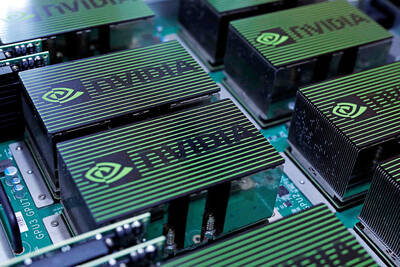Taiwan’s past success in the PC industry has left it overly-focused on computers when instead it needs to concentrate on mobility, concludes a new report from the US-Taiwan Business Council.
“The mobile world consisting of smartphones, tablets and other devices is just beginning, yet it is already cannibalizing the PC market,” the report said.
Taiwan could be forgiven for missing the mobility trend — since so many others have missed it as well — but even the death of the nation’s Dynamic-RAM (DRAM) industry has failed to awaken Taipei to the danger.
“The fact is that South Korea moved early and quickly into mobility, while Taiwan has dallied,” the council’s annual semiconductor review says.
REFOCUSING
The report emphasizes that the sooner Taiwan accepts the new world order in information technology, the faster its government and corporations can refocus and move forward in an industry they could dominate.
“The clearest sign that Taiwan remains unclear about the mobile revolution is the lack of 4G telecommunications services on the island,” the report said.
South Korea’s first 4G network went up in mid-2011 and they have developed handsets, Web services, apps and more — far ahead of everyone else.
“To compete in the future, Taiwan needs to refocus its industrial policies on mobility — including getting its 4G networks up and running — so that it can unleash its entrepreneurial population and innovative companies into the fray,” the report said.
In the aftermath of the 2008 financial crisis, South Korea has surged ahead, while Taiwan has “languished,” it said.
LITTLE ECFA BENEFIT
This happened despite the Economic Cooperation Framework Agreement (ECFA) with China.
According to the report, South Korea is now beating Taiwan in China.
“The simple fact is that South Korea has been quicker to latch onto major trends, such as mobility, while Taiwan has rested on its laurels,” the report said.
The most “devastating aspect” of Taiwan’s lack of foresight in mobility so far has been the erosion of a key part of its PC sector — its DRAM industry.
“Signing [the] ECFA, which lowered import duties on many items exported from Taiwan to China, was trumpeted as a victory for Taiwan companies, and it appeared that the door to China-driven prosperity was open,” the report said.
However, Chinese companies have been fierce competitors in their home market and higher-end Taiwanese goods have also faced stiff competition from South Korea.
As a result, Taiwanese companies have not benefitted from the ECFA as much as hoped.
The report stresses that Taiwan needs to move quickly and aggressively to catch up and it needs to do so “right now.”
Taiwan should make its 4G networks a top priority, says the report, and the 4G license auction should be held as soon and as cheaply as possible.

Leading Taiwanese bicycle brands Giant Manufacturing Co (巨大機械) and Merida Industry Co (美利達工業) on Sunday said that they have adopted measures to mitigate the impact of the tariff policies of US President Donald Trump’s administration. The US announced at the beginning of this month that it would impose a 20 percent tariff on imported goods made in Taiwan, effective on Thursday last week. The tariff would be added to other pre-existing most-favored-nation duties and industry-specific trade remedy levy, which would bring the overall tariff on Taiwan-made bicycles to between 25.5 percent and 31 percent. However, Giant did not seem too perturbed by the

AI SERVER DEMAND: ‘Overall industry demand continues to outpace supply and we are expanding capacity to meet it,’ the company’s chief executive officer said Hon Hai Precision Industry Co (鴻海精密) yesterday reported that net profit last quarter rose 27 percent from the same quarter last year on the back of demand for cloud services and high-performance computing products. Net profit surged to NT$44.36 billion (US$1.48 billion) from NT$35.04 billion a year earlier. On a quarterly basis, net profit grew 5 percent from NT$42.1 billion. Earnings per share expanded to NT$3.19 from NT$2.53 a year earlier and NT$3.03 in the first quarter. However, a sharp appreciation of the New Taiwan dollar since early May has weighed on the company’s performance, Hon Hai chief financial officer David Huang (黃德才)

NVIDIA FACTOR: Shipments of AI servers powered by GB300 chips would undergo pilot runs this quarter, with small shipments possibly starting next quarter, it said Quanta Computer Inc (廣達), which supplies artificial intelligence (AI) servers powered by Nvidia Corp chips, yesterday said that AI servers are on track to account for 70 percent of its total server revenue this year, thanks to improved yield rates and a better learning curve for Nvidia’s GB300 chip-based servers. AI servers accounted for more than 60 percent of its total server revenue in the first half of this year, Quanta chief financial officer Elton Yang (楊俊烈) told an online conference. The company’s latest production learning curve of the AI servers powered by Nvidia’s GB200 chips has improved after overcoming key component

UNPRECEDENTED DEAL: The arrangement which also includes AMD risks invalidating the national security rationale for US export controls, an expert said Nvidia Corp and Advanced Micro Devices Inc (AMD) have agreed to pay 15 percent of their revenue from Chinese artificial intelligence (AI) chip sales to the US government in a deal to secure export licenses, an unusual arrangement that might unnerve both US companies and Beijing. Nvidia plans to share 15 percent of the revenue from sales of its H20 AI accelerator in China, a person familiar with the matter said. AMD is to deliver the same share from MI308 revenue, the person added, asking for anonymity to discuss internal deliberations. The arrangement reflects US President Donald Trump’s consistent effort to engineer